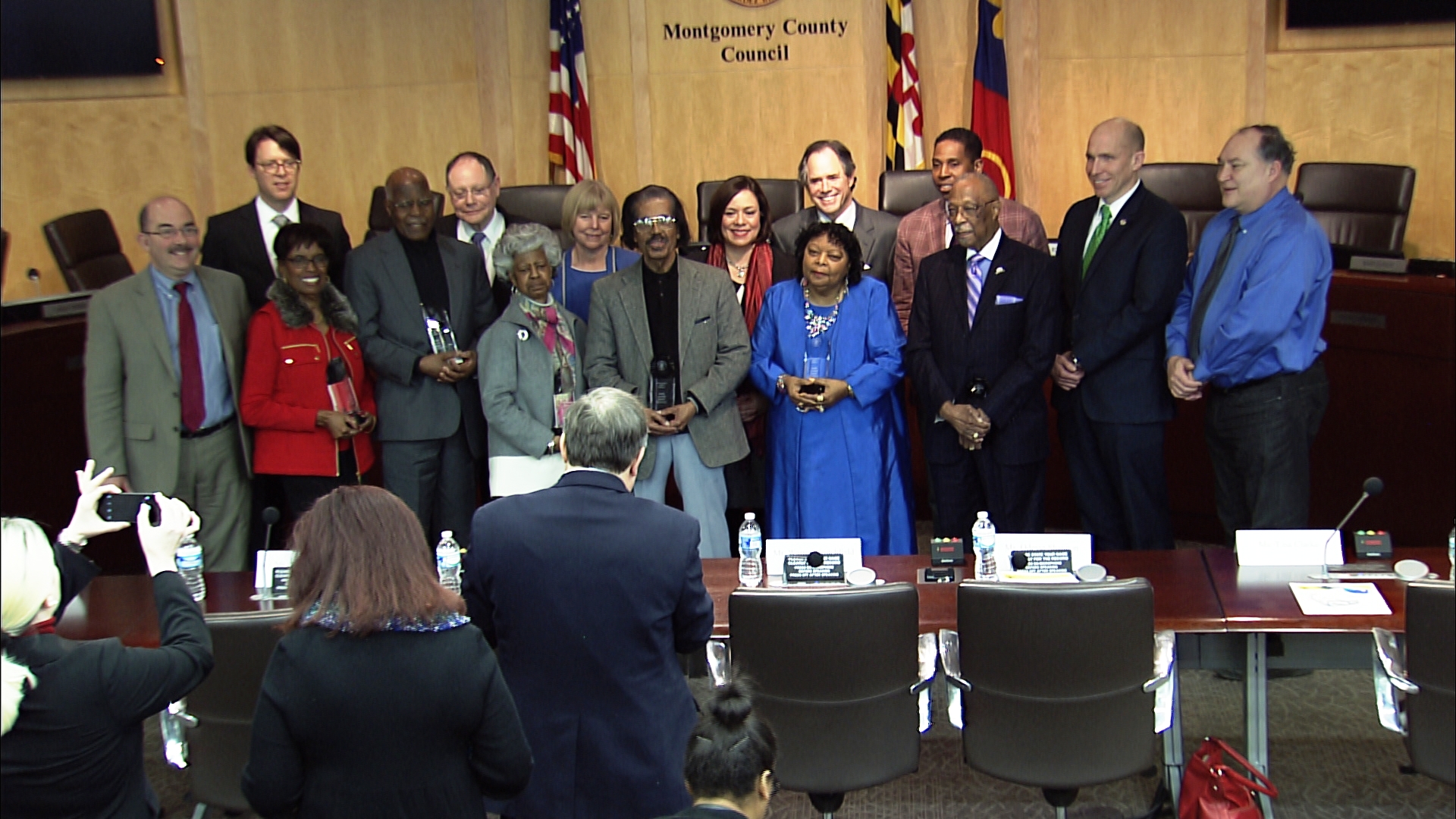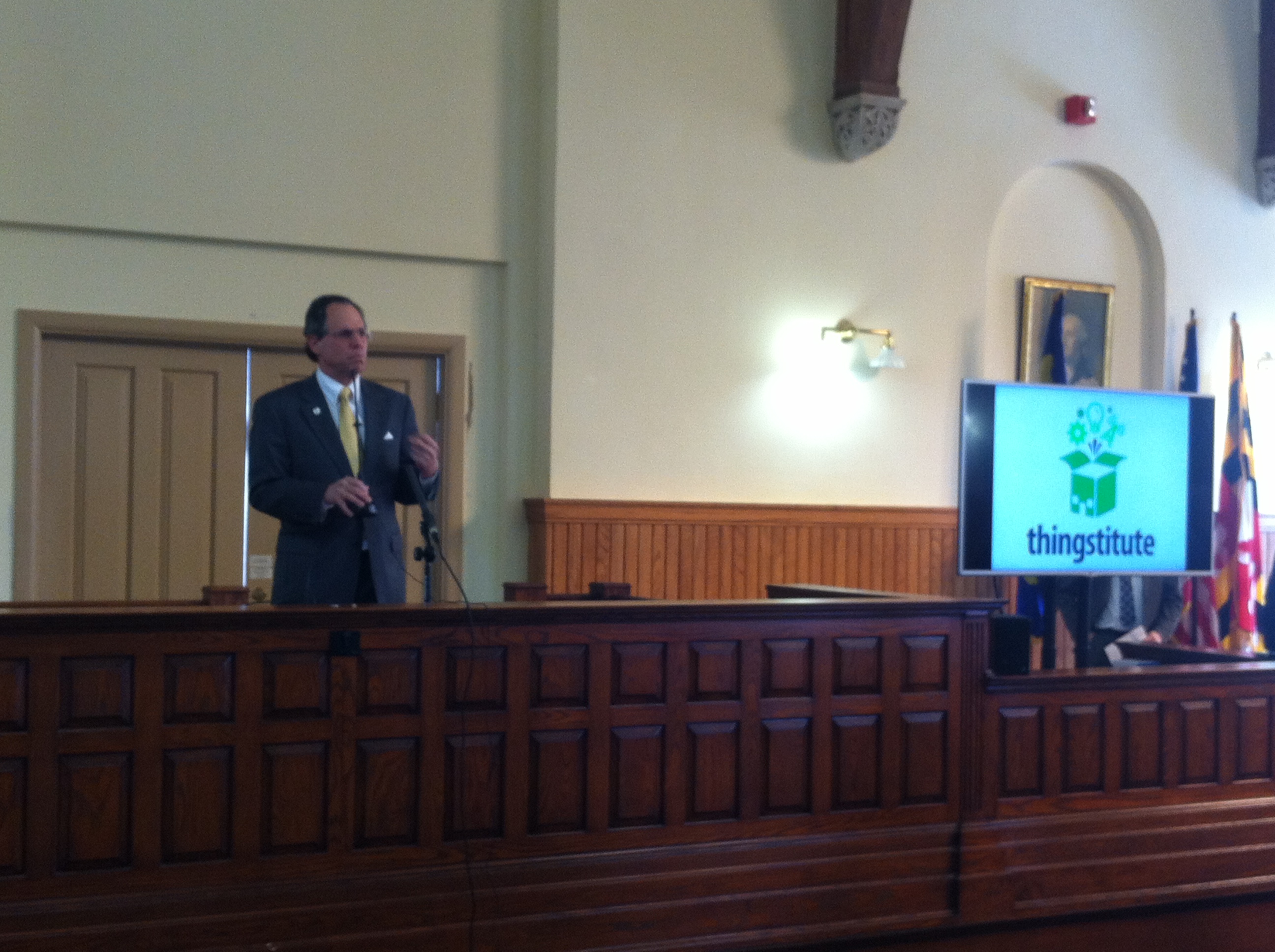Please
Join
Me
for
this
Important
Conversation
Infrastructure
and
Growth:
Are
We
Keeping
Pace?
By
now
you
have
probably
heard
about
a forum
I
am
hosting
on
Saturday,
March
7th.
The
purpose
of
the
event,
called
Infrastructure
and
Growth:
Are
We
Keeping
Pace?,
is
to
facilitate
a
cross-agency
dialogue
with
residents
like
you
about
growth
in
our
county,
how
we
are
planning
for
it,
and
to
examine
what
is
working
well
and
determine
what
improvements
can
be
made
to
our
collective
efforts.
So
often,
while
out
and
about
at
various
events,
I
hear
many
common
questions
from
school
community
leaders:
Why
does
the
county
keep
allowing
new
growth
when
our
schools
are
already
so
overcrowded?
Why
aren’t
developers
being
required
to
pay
more
for
the
burden
they
are
putting
on
our
schools?
Why
does
so
much
of
the
new
growth
have
to
go
down
county?
How
are
we
going
to
pay
for
all
the
school
projects
that
need
to
be
done?
Are
all
the
county
agencies
actually
talking
to
one
another
as
we
develop
master
plans?
Are
we
really
forecasting
student
generation
rates
effectively?
But
at
the
same
time,
I
hear
from
the
business
community:
Why
is
it
so
expensive
to
do
business
in
Montgomery
County?
Why
is
the
development
process
so
onerous?
And
I
hear
a
lot
about
maintaining
our
competitiveness
in
the
region.
Reconciling
these
naturally
conflicting
viewpoints
is
not
easy
and
maybe
not
even
possible.
But
I
believe
it’s
important
for
us
to
talk
about
these
issues
as
a
community.
It’s
time
to
bring
everyone
together
to
talk
about
growth
–
both
from
the
natural
turnover
of
our
existing
neighborhoods
as
well
as
from
new
development
–
and
whether
our
Adequate
Public
Facilities
Ordinance
and
our
processes
are
doing
what
they
should
to
keep
pace.
It’s
time
to
roll
up
our
sleeves
and
engage
with
one
another
productively,
seriously,
and
creatively
to
produce
positive
outcomes
–
outcomes
that
work
for
all
residents
while
ensuring
a
prosperous
future.
Attached,
you
will
find
a flyer
for
the
forum
as
well
as
the agenda
for
the
day.
With
less
than
eight
hours,
one
event
can
never
be
all
things
to
all
people,
so
I
ask
for
your
understanding
that
this
forum
is
only
the
beginning
of
a
conversation.
We
have
tried
our
very
best,
in
close
consultation
with
the
Planning
Department,
MCPS,
and
MCCPTA
representatives
to
plan
for
a
busy,
productive
event
that
will
speak
to
a
broad
audience.
I
am
pleased
that
the
leadership
of
our
County,
including
the
County
Executive,
the
Planning
Board
Chair,
the
Acting
Superintendent
of
Schools,
the
President
of
the
School
Board,
and
many
of
my
colleagues
on
the
Council
and
the
Board
of
Education
will
be
active
participants
in
this
forum.
I
hope
you
will
consider
joining
us
for
this
important
conversation.
If
you
haven’t
already,
please
register
for
the
event,
and
childcare
if
you
need
it,
at
http://www.montgomerycountymd.gov/berliner/.
I
look
forward
to
hearing
what
ideas
are
generated
from
the
day’s
discussion.

Roger
Berliner
District
1
###
The
County
&
Liquor
–
Time
for
Serious
Reform
We
are
often
proud
of
our
county’s
willingness
to
stand
alone
on
important
issues.
In
the
case
of
liquor
control,
our
solitary
stance
does
us
a
disservice.
Montgomery
County
is
literally
the
only
local
government
in
America
that
pre-empts
private-sector
distributors
from
selling
beer,
wine,
and
spirits.
All
restaurants
and
stores
in
the
county
must
buy
alcohol
directly
from
the
county
government,
while
restaurants
and
stores
in
all
other
Maryland
and
regional
jurisdictions
enjoy
a
less
rigorous,
more
business-friendly
liquor-control
policy.
Even
with
good
people,
with
the
best
of
intentions,
trying
to
serve
the
consumer
preferences
of
a
million
residents
with
one
monopoly
distributor
is
destined
to
fail.
By
almost
every
measure,
our
monopoly
fails
us.
Residents
drive
to
Virginia
to
buy
alcohol;
our
restaurants
complain
of
poor
service
and
poor
choice;
microbreweries
hesitate
to
locate
here;
and
young
and
old
spend
entertainment
dollars
elsewhere
that
could
be
spent
at
home.
These
aren’t
insignificant
impacts.
The
quality
of
restaurants,
entertainment,
and
nightlife
has
a
big
impact
on
this
county’s
economic
competitiveness.
These
amenities
support
the
new
urban
quality
of
life
that
both
younger
workers
and
empty
nesters
are
seeking,
and
can
be
easily
found
elsewhere
in
the
region.
In
the
dynamic
social
and
economic
environment
we
seek
to
foster,
the
Department
of
Liquor
Control
is
regrettably
a
model
borne
of
a
different
era,
one
not
well
suited
for
the
future.
Given
these
factors,
you
may
ask
what
prevents
us
from
making
reforms?
The
answer
is
twofold:
Our
county
derives
a
net
profit
of
approximately
$30
million
a
year
from
its
monopoly
control.
That’s
real
money
used
for
many
good
purposes.
Additionally,
options
for
reform
could
affect
county
employees,
which
is
a
serious
consideration.
I
believe
there
are
answers
to
those
concerns,
and
I
am
grateful
that
Council
President
George
Leventhal
has
formed
an
ad
hoc
committee
under
the
leadership
of
Councilmember
Hans
Riemer
to
review
these
issues,
as
well
as
public
health
and
public
safety
concerns.
That
work
began
Feb.
27
with
a
review
of
the
recently
released
assessment
by
our
Office
of
Legislative
Oversight
of
our
current
system,
an
assessment
that
includes
a
range
of
reform
options.
Assuming
our
council
can
reach
consensus
on
a
positive
path
toward
reform,
we’ll
need
our
state
delegation
to
support
reform
as
well.
Our
county
doesn’t
have
the
legal
authority
to
make
reforms
on
our
own.
Liquor
laws
are
the
domain
of
the
state.
Nonetheless,
I
remain
convinced
that,
working
together
with
all
affected
stakeholders,
we
can
bring
about
a
more
prosperous,
enlivened,
and
competitive
Montgomery
County,
a
future
in
which
our
county
is
made
whole
financially
and
where
more
jobs,
not
less,
are
created.
That’s
a
future
worth
fighting
for.
Moving
Transit
Forward

I
am
a
strong
supporter
of
the
county's
proposed
Bus
Rapid
Transit
system.
I
believe
that
BRT
is
critical
to
improving
our
quality
of
life,
our
county's
economic
future,
and
reducing
gridlock.
Our
goal
must
be
to
begin
putting
this
system
in
place
sooner
rather
than
later.
Yet
I
also
am
keenly
aware
that
the
proposal
has
made
many
nervous
about
the
impact
of
BRT
on
their
neighborhoods
and
traffic,
and
have
questioned
the
county’s
capacity
to
do
something
this
big.
As
a
result,
my
commitment
to
our
community
has
been
to
make
sure
that
as
we
move
forward,
we
do
so
in
a
focused,
cost
effective,
incremental
manner
with
full
public
engagement.

Regrettably,
the
controversy
over
the
County
Executive’s
proposal
to
create
an
Independent
Transit
Authority
(ITA)
and
allowing
for
our
county
to
exceed
the
charter
limit
in
order
to
fund
the
operating
costs
of
our
transit
system
moved
us
backward,
not
forward.
Many
saw
the
authority
as
providing
less
public
accountability
when
we
had
promised
more.
Some
saw
the
proposal
as
an
effort
to
“work
around”
the
road
centric
culture
of
our
current
Department
of
Transportation
and
the
cumbersomeness
of
our
procurement
process.
Others
argued
that
to
put
a
proposal
on
the
table
to
exceed
the
charter
limit
for
operating
costs
now,
when
we
have
existing
authority
for
capital
costs
and
don’t
have
a
clue
what
the
operating
costs
will
be,
made
little
sense.
I
believe
we
need
to
get
back
to
basics
and
move
forward
together.
What
we
need
most
of
all
at
this
moment
in
time
is
to
find
a
Director
of
our
Department
of
Transportation
that
is
a
nationally
recognized
transit
expert.
We
have
not
had
that
at
DOT,
and
we
absolutely
need
it.
Instead
of
working
around
a
road
centric
culture,
let’s
change
the
culture.
If
our
procurement
process
threatens
our
transit
goals,
as
it
stifles
almost
everything
else,
then
it
is
just
one
more
reason
to
roll
up
our
sleeves
and
reform
our
procurement
process.
If
we
do
those
things,
and
our
transit
leader
tells
us
several
years
from
now
that
we
can’t
accomplish
our
goals
using
traditional
approaches,
that
we
have
met
our
public
engagement
responsibilities,
and
that
we
need
an
alternative
structure,
that
will
be
the
time
to
have
a
serious
public
conversation
about
an
ITA.
In
the
meantime,
I
will
be
focused
on
making
incremental,
cost-effective,
and
real
progress
towards
making
BRT
a
reality.
Improvements
Coming
to
Wall
Park

What
do
you
know
about
Wall
Park?
Probably
not
much.
Sadly,
many
people
don’t
even
know
it
exists.
The
property
called
Wall
Park,
owned
and
operated
by
our
Department
of
Parks,
surrounds
the
parking
lots
and
facilities
at
the
Kennedy
Shriver
Aquatic
Center
in
White
Flint
and
is
currently
underutilized.
The
County’s
White
Flint
Sector
Plan
approved
in
2010
calls
for
an
expansion
of
the
park
and
a
new
recreation
center
adjacent
to
the
aquatic
center
which
will
happen
eventually
after
surface
parking
is
removed,
roads
are
realigned,
and
a
new
parking
structure
is
built.
But
there
are
certainly
things
we
can
do
to
improve
Wall
Park
now
– which
is
why
I
wrote
to
our
Department
of
Parks
Director
Mike
Riley
back
in
October
2014
asking
him
to
look
at
low-cost
improvements
until
such
time
the
bigger
expansion
can
take
place.
I
am
pleased
to
share
with
you
that
improvements
are
now
in
the
works
and
that
the
Department
believes
we
could
see
some
progress
by
mid-summer!
Parks
Staff
is
brainstorming
a
variety
of
ways
to
activate
the
park
so
it
can
be
better
used
and
enjoyed
by
nearby
residents
and
visitors
to
the
aquatic
center.
Stay
tuned
for
more
information
in
the
next
few
months!
Keeping
Our
Sidewalks
Open
.jpg)
By
the
summer
of
2014,
it
became
clear
to
residents
of,
and
visitors
to,
downtown
Bethesda,
that
far
too
many
sidewalks
were
closed
due
to
construction
projects.
These
closures
appeared
to
be
occurring
despite
the
fact
that,
in
2008,
I
sponsored
legislation
that
required
that
pedestrian
accommodations
be
made
for
all
sidewalk
closures
longer
than
two
weeks,
unless
waivers
were
granted.
On
August
7,
2014,
I
asked
for
information
from
the
Department
of
Transportation
about
the
waivers
that
had
been
granted.
And
on
January
20,
I
introduced
Bill
3-15,
a
simple
bill
that
would
require
a
sign
to
be
posted
whenever
a
sidewalk
was
closed,
with
information
detailing
the
length
of
the
closure
and
the
appropriate
contact
phone
number.
I
am
confident
that
the
full
Council
will
pass
this
measure
shortly.
Since
then,
the
Departments
of
Transportation
and
Permitting
Services
have
informed
me
that
they
have
taken
significant
steps
to
reduce
sidewalk
closures
on
county
roads
going
forward.
They
have
updated
the
traffic
control
standards
they
give
to
developers,
have
added
more
requirements
as
part
of
the
traffic
control
plan
permitting
process,
created
a
new
work
group
to
monitor
permitted
sidewalk
closures,
and
assigned
more
inspection
resources
to
provide
better
enforcement.
They
also
are
implementing
a
signage
requirement
similar
to
what
we
are
proposing
in
Bill
3-15.
The
steps
that
the
Executive
Branch
have
taken
should
have
a
measurable
impact,
and
will
make
all
of
our
downtowns
safer
for
pedestrians,
bicyclists,
and
vehicles,
as
well
as
helping
our retailers
and
restaurateurs that
are
often
affected
by
construction.
More
work
is
needed
at
the
state
level,
where
recent
closures
on
Old
Georgetown
Road
and
Wisconsin
Avenue
have
caused
headaches.
I
am grateful
that
Delegate
Marc
Korman,
joined
by
Senator
Susan
Lee
and
Delegates
Ariana
Kelly
and
Bill
Frick,
have
sponsored
similar
legislation
at
the
state
level.
Working
together,
we
hope
to
address
this
sidewalk
closure
issue
for
all
roads
in
our
community.
Making
Metro
Safe
&
Affordable
 Metro
may
be
the
single
most
important
regional
institution
we
have.
We
absolutely
need
it
to
succeed.
And
it
clearly
has
not
succeeded. Metro
may
be
the
single
most
important
regional
institution
we
have.
We
absolutely
need
it
to
succeed.
And
it
clearly
has
not
succeeded.
Like
many
of
you,
I
was
very
taken
aback
as
I
followed
the
tragic
events
that
unfolded
during
the
incident
at
the
L'Enfant
Plaza
Metro
station.
At
my
suggestion,
our
Washington
Region
Council
of
Governments,
where
I
have
the
privilege
of
serving
as
Vice
Chairman,
invited
WMATA
and
the
National
Transportation
Safety
Board
to
share
with
us
what
they
have
learned
and
what
measures
they
are
taking
to
improve
safety.
I
also
invited
our
acting
Fire
Chief
to
share
his
assessment
of
the
situation
with
our
T&E
committee,
and
was
gratified
to
learn
how
on
top
of
the
situation
our
county
officials
are.
At
the
same
time,
I
was
deeply
concerned
when
I
reviewed
the
recent
proposal
by
WMATA
staff
to
increase
fares
and
cut
services
to
meet
their
budget
targets.
From
my
perspective,
that
approach
only
beckoned
a
“death
spiral”
–
there
would
be
fewer
riders,
generating
fewer
resources,
causing
more
budget
deficits
that
would
lead
to
more
service
cut
backs.
Not
a
prescription
for
success.
As
a
result,
my
T&E
colleagues,
Councilmembers
Floreen
and
Hucker,
joined
with
me
in
urging
the
Board
of
Directors
of
WMATA
to
take
a
different
approach.
I
am
pleased
to
report
that
the
Board
acted
consistent
with
our
advice
and
found
other
ways
to
close
the
budget
gap.
Now,
we
must
turn
to
the
long
term
issues
–
how
does
WMATA
restore
public
confidence
in
its
system
and
how
can
we
ensure
that
WMATA
has
the
funds
it
needs
to
provide
a
first
class
metro
system.
Pesticides
Legislation
Update
As
you
may
be
aware,
Council
President
George
Leventhal
has
introduced
legislation
(Bill
52-14)
with
four
cosponsors
that
would
ban
the
use
of
certain
pesticides
on
lawns
for
ornamental
purposes
and
on
county
property.
Exemptions
to
the
pesticide
restrictions
are
provided
for
controlling
weeds
or
invasive
species,
and
for
agriculture
and
golf
courses.
Our
county
would
be
the
first
major
jurisdiction
in
the
United
States
to
adopt
such
a
measure.
However,
many
provinces
in
Canada
and
Europe
have
adopted
similar
restrictions.
It
is
no
exaggeration
to
say
that
this
has
proven
to
be
one
of
the
most
controversial
pieces
of
legislation
before
the
Council
since
I
was
first
elected
in
2006.
On
the
one
hand,
we
have
heard
from
many,
including
respected
physicians,
who
point
to
scientific
research
that
links
pesticide
exposures
to
serious
threats
to
human
and
environmental
health;
that
the
use
of
such
products
affects
more
than
just
the
homeowner
who
uses
the
products,
but
neighborhood
children
and
pets
in
particular,
and
therefore
is
not
a
“property
rights”
issue
but
instead
a
public
health
issue;
that
there
are
organic
alternatives
that
have
been
shown
to
work
in
our
climate;
and
that
the
“precautionary
principle”
should
be
invoked
on
behalf
of
the
public’s
health.
The
other
side
of
the
argument
has
also
been
forcefully
presented,
including
by
former
EPA
officials
who
argued
that
the
science
doesn’t
support
the
ban;
the
“green
team”
at
our
county’s
Park
&
Planning
Commission
does
not
believe
that
the
alternatives
would
keep
our
playing
fields
in
shape,
and
have
argued
that
pesticides,
used
properly,
help
protect
plants;
homeowners
argue
that
their
lawns
represent
a
significant
portion
of
their
property
value
that
would
be
adversely
affected
by
this
legislation;
and
others
have
argued
that
the
Council
does
not
have
more
expertise
than
the
federal
and
state
government
that
have
found
the
exposures
associated
with
lawn
care
and
playing
fields
acceptable.
In
response
to
the
passions
stroked
by
this
legislation,
we
held
an
unprecedented
second
public
hearing
on
February
12.
Now,
the
issue
moves
to
the
Transportation,
Infrastructure,
Energy
&
Environment
Committee
(T&E)
that
I
chair.
On
March
16
and
March
30,
the
T
&
E
committee
will
hold
two
work
sessions
on
this
legislation.
We
will
hear
from
national
health,
environmental,
and
lawn
care
experts,
as
well
as
local
stakeholders,
including
our
own
Department
of
Environmental
Protection.
You
can
see here
the
letter
I
have
sent
to
the
Director
of
the
National
Cancer
Institute
requesting
their
assistance
in
this
matter.
Given
the
press
of
the
budget,
and
after
conferring
with
the
Council
President,
the
Committee
will
not
then
take
up
the
measure
again
until
after
the
budget
in
June.
I
believe
strongly
in
reasoned
decision-making,
and
on
this
important
and
controversial
issue,
you
have
my
guarantee
that
we
will
not
act
without
in-depth
consideration
of
every
issue.
Paid
Sick
Leave
Bill
Update
Along
with
the
aforementioned
pesticides
legislation,
another
big
piece
of
legislation
that
is
before
us
is
a
bill
that
would
require
employers
in
the
County
to
provide
earned
sick
and
safe
leave.
Many
other
jurisdictions
across
the
country
have
adopted
similar
measures
including
San
Francisco,
Seattle,
Philadelphia,
and
Washington
DC,
as
well
as
Connecticut
and
California.
Recently,
the
HHS
Committee
that
I
sit
on
held
a
public
hearing
where
many
in
our
community
voiced
their
opinions.
We
heard
stories
of
mothers
afraid
to
take
time
off
to
take
care
of their
children;
of
those
most
vulnerable
workers
who
show
up
sick
rather
than
risk
being
fired.
We
also
heard
from
our
business
community,
who
expressed
their
concerns
as
to
the
impact
it
will
have
on
their
capacity
to
run
their
businesses
effectively.
Currently,
the
Maryland
General
Assembly
is
also
considering
a
statewide
version
of
paid
sick
leave
legislation.
So
for
now,
our
Council
will
not
be
acting
on
this
issue
until
we
get
a
better
sense
as
to
what
will
happen
in
Annapolis
surrounding
this
issue.
Until
then,
I
want
to
hear
your
thoughts
on
this
legislation.
Please
contact
Warren
Hansen
of
my
staff
and
let
him
know
what
you
think.
Your
input
will
be
invaluable
to
me
as
this
process
moves
along.
Turning
the
Page
on
Artificial
Turf
Infill
In
February,
our
Council
unanimously
voted
to
approve
a
resolution
that
I
introduced
which
states
that
all
future
artificial
turf
projects
funded
by
the
county
will
only
use
organic
infill
materials
instead
of
crumb
rubber.
I
believe
this
resolution
is
by
no
means
the
last
word
on
the
issue
of
artificial
turf
infill,
but
I
do
feel
it
represents
a
turning
of
the
page
on
how
we
address
the
concerns
we
have
heard
in
the
community
regarding
heat
island
effect,
concussions,
and
potential
toxicity
of
crumb
rubber.
This
resolution
came
about
after
I,
along
with
Council
President
Leventhal
and
Councilmember
Katz,
visited
the
newly
open
artificial
turf
field
at
Lakelands
Park
in
Gaithersburg
last
fall (photo
above).
After
seeing
the
field
first
hand
and
hearing
from
city
officials
and
the
company
that
provided
the
infill
(a
mix
of
coconut
husk,
cork,
and
rice
husk),
I
became
convinced
that
there
is
no
doubt
that
organic,
plant
based
infill
is
now
a
viable
alternative
to
crumb
rubber.
A
review
done
by
our
Parks
Department,
which
was
discussed
at
a
recent
joint
session
of
the
Council’s
T
&
E
and
Education
Committees,
confirmed
in
fact
that
plant-based
infill
materials
are
a
viable
alternative
and
can
be
successfully
used
to
build
and
maintain
artificial
turf
fields
going
forward.
Both
the
Parks
Department
and
Montgomery
County
Public
Schools
have
stated
their
commitment
to
pursuing
alternate
infill
materials
in
future
field
installations.
The
next
two
projects
that
will
use
this
organic
infill
are
likely
to
be
the
Winston
Churchill
High
School
stadium
field
and
a
playing
field
at
the
Laytonia
Recreational
Park
in
Derwood.
It
is
our
job
as
policymakers
to
do
the
best
we
can
to
reconcile
the
increased
demand
for
playing
fields
in
our
county
with
the
need
to
protect
our
children
and
provide
our
parents
with
greater
peace
of
mind
about
the
fields
their
children
are
playing
on.
I
am
pleased
that
we
as
a
Council,
along
with
our
school
system
and
Parks
Department,
are
speaking
with
one
voice
on
this
important
matter.
Commemorating
Black
History
Month

Last
Tuesday,
our
Council
held
a
moving
ceremony
to
commemorate
Black
History
Month,
at
the
initiative
of
Council
President
Leventhal.
At
the
ceremony,
we
heard
riveting
testimony
from
veterans
of
Montgomery
County’s
civil
rights
struggle.
Simply
put,
we
all
owe
a
great
deal
of
gratitude
from
those
we
heard
from.
Their
personal
testimony
and
stories
harken
back
to
a
not-so-distant
time
when
there
was
the
injustice
of
institutional
racism
in
our
county
and
country.
As
I
recalled
during
the
ceremony,
I
can
remember
spending
my
summers
in
1960
and
1961
in
Fayette,
Mississippi.
And
my
mother
and
I
would
go
to
the
store
that
my
grandfather
ran.
I
remember
seeing
the
“Whites
Only”
sign
over
the
water
fountain
and
remembering
thinking
to
myself
“What
is
this?
Why
is
this?”
And
I
vividly
remember
my
mother
turning
to
me
and
saying
“One
day
you
will
understand.”
I
don’t
know
if
that
day
has
ever
come
or
ever
will.
Since
the
early
1960s,
significant
progress
has
been
made
in
this
struggle
both
at
a
national
and
local
level.
But
my
colleagues
and
I
were
reminded
last
Tuesday
that
more
work
still
is
to
be done
if
we
are
to
truly
live
up
to
our
progressive
ideals
of
justice
and
equality
for
all,
both
here
in
Montgomery
County
and
in
the
United
States
of
America.
While
I
am
both
a
lawyer
and
a
legislator,
I
have
become
skeptical
of
how
much
more
we
can
achieve
in
those
realms.
I
think
the
next
frontier
is
an
inner
one
–
the
province
of
our
heart
and
spirit.
When
we
come
to
understand
that
we
are
one,
so
many
of
our
issues
will
fall
by
the
wayside.
This
is
not
a
simple
matter
obviously.
A
brain
is
hard
wired
in
favor
of
bias.
And
the
only
way
to
overcome
is
that
through
the
practice
of
self-awareness.
I
want
to
thank
Council
President
Leventhal
for
pulling
this
event
together,
as
it
was
a
fitting
way
to
mark
this
important
month.
And
I
want
to
thank
my
colleagues
for
their
honest
and
heartfelt
stories
about
dealing
with
this
issue
of
racism
and
bias
in
our
society.
Ultimately
though,
this
ceremony
wasn’t
about
us
as
a
Council.
It
was
about
honoring
those
who
blazed
a
trail
to
equality,
who
helped
remind
us
of
our
collective
unfinished
work.
Planning
for
Our
Seniors
One
of
the
first
sessions
I
attended
as
a
new
member
of
the
Health
and
Human
Services
Committee
was
a
discussion
with
our
Commission
on
Aging
about
their
latest
summer
study
which
examined
whether
adequate
attention
is
being
provided
for
the
needs
of
our
seniors
in
the
planning
process.
This
study
is
of
growing
importance
given
the
concurrent
growth
in
our
county’s
senior
population,
and
recent
and
soon
to
be
unveiled
master
and
sector
plans
for
White
Flint,
Westbard,
Chevy
Chase
Lake,
and
the
Bethesda
CBD
with
mixed-used
urbanized
complexes.
The
Commission’s
study
wanted
future
planning
to
consider
the
needs
of
seniors
regarding
issues
such
as
housing
options,
building
access,
available
public
transportation,
access
to
public
parks,
social
opportunities,
and
access
to
healthcare.
And
I
do
not
disagree
with
that.
Because
I
have
found
what
our
seniors
want
in
their
communities
are
some
of
the
same
things
our
millennials
want.
While
more
work
remains
to
be
done
to
make
that
vision
a
full
reality,
we
have
been
ahead
of
this
curve
by
implementing
steps
laid
out
in
our
Senior
Agenda.
In
the
weeks
and
months
ahead,
I
look
forward
to
doing
a
fuller
review
of
progress
we
have
made
in
implementing
the
Senior
Agenda
and
working
with
the
Commission
on
Aging
as
we
plan
for
a
senior
forum later
this
year,
similar
to
the
three
senior
forums
I
hosted
in
my
previous
two
terms.
Montgomery
County
seeks
to
be
a
“community
for
a
lifetime.”
And
I
know
that
I,
along
with
my
colleagues,
want
to
do
everything
we
can
in
our
power
to
ensure
that
holds
true
for
all
our
seniors.
Council
Passes
E-cigarette
Ban
Legislation
Our
Council
today
passed
legislation
prohibiting
the
use
of
e-cigarettes
wherever
smoking
is
currently
prohibited
in
the
county.
Councilmember
Floreen
proposed
the
bill,
which
I
was
pleased
to
cosponsor
with
all
of
my
colleagues.
The
bill
specifically
would
add
e-cigarettes
to
the
county’s
ban
on
smoking
in
certain
public
places.
Currently,
the
county
prohibits
smoking
in
bars,
restaurants,
businesses,
workplaces,
elevators,
hospitals,
county
buildings,
rail
stations,
bus
stops
and
schools,
and
on
county
property.
Under
this
legislation,
vape
shops
would
be
exempt
from
the
ban.
While
e-cigarettes
have
been
used
to
help
people
successfully
kick
their
smoking
habits,
the
reality
is
that
their
use
by
kids
is
booming
–
creating
potentially
the
next
generation
of
smokers.
263,000
non-smoking
kids
tried
e-cigarettes
in
2013
—
three
times
as
many
as
in
2011,
according
to
a
study
released
by
the
Centers
for
Disease
Control
and
Prevention
in
August
2014.
In
addition,
about
44%
of
non-smoking
kids
who
experimented
with
e-cigarettes
said
they
intend
to
smoke
regular
cigarettes,
compared
to
22%
of
kids
who
had
never
tried
e-cigs.
This
is
something
that
we
as
policymakers
should
be
proactively
addressing.
While
the
totality
of
scientific
evidence
is
still
inconclusive
about
the
public
health
impacts
of
e-cigarettes,
there
is
a
growing
body
of
research
to
suggest
that
their
impact
is
not
positive.
With
the
Council’s
action,
we
have
joined
cities
like
New
York,
Chicago,
Boston,
and
closer
to
home
–
Washington
DC
and
Baltimore
in
banning
the
use
of
these
devices
wherever
cigarette
use
is
banned.
Nonprofit
of
the
Month:
Friends
of
the
Library,
Montgomery
County

For
this
month’s
installment
of
“Nonprofit
of
the
Month,”
I
am
pleased
to
feature
Friends
of
the
Library,
Montgomery
County
(FOLMC).
As
the
former
Council
Lead
on
Libraries,
I
know
our
library
system
is
one
our
county’s
greatest
assets,
so
ably
serving
the
needs
of
our
diverse
communities.
FOLMC
is
a
nonprofit
organization
whose
mission
is
to
strengthen,
promote,
and
champion
our
public
library
system,
as
it
goes
about
fulfilling
this
important
work.
It
currently
has
17
chapters,
and
operates
two
award-winning
used
book
stores
in
Rockville
and
Wheaton.
In
2014,
FOLMC
was
able
to
fund
interactive
Go!
Kits,
children's
computer
stations,
and
the
summer
reading
program
for
Montgomery
County
Public
Libraries
(MCPL)
among
other
enhancements
and
programs.
FOLMC,
along
with
libraries
across
the
country,
just
concluded
“Library
Lovers'
Month”
in
February.
I
hope
you
were
able
to
participate
in
the
festivities
in
February,
but
are
also
able
to
show
your
support
for
our
libraries
year
around,
whether
you
are
a
senior,
a
child,
or
a
parent.
Our
libraries
have
so
much
to
offer
our
diverse
communities
throughout
the
county.
To
join
or
receive
more
information
about
FOLMC,
call
240-777-0020
or
visit
www.folmc.org. |
|
Want
to
know
more
about
the
March
7 Infrastructure
and
Growth:
Are
We
Keeping
Pace?
event?

Click
on
the
above photo
below
to
view
the
YouTube
video
summary.
Pesticides
Legislation:
Let
Your
Voice
Be
Heard

Bill
52-14
before
the
County
Council
would
ban
the
use
of
certain
pesticides
on
lawns
for
ornamental
purposes
and
on
county
property.
Exemptions
to
the
pesticide
restrictions
are
provided
for
controlling
weeds
or
invasive
species,
and
for
agriculture
and
golf
courses.
MCPS
Superintendent
Search
Public
Forum
Montgomery
County
Public
Schools
wants
to
hear
from
you
as
it
undergoes
its
search
process
for
a
new
Superintendent.
Tomorrow
night,
March
4
at
7
pm,
MCPS
will
host a
public
forum
where
you
can
express
what
characteristics
you
are
looking
for
in
the
next
Superintendent.
MCPS
has
a
stated
goal
of
having
its
new
leader
on
board
by
July
1
this
year,
so
your
comments
now
will
be
important
as
the
school
system
moves
forward
in
its
search.
The
forum
will
be
held
at
Walter
Johnson
High
School,
located
at
6400
Rock
Spring
Drive
in
Bethesda.
Planning
Department
Continues
Work
on
Bethesda
Downtown
Plan
The
Planning
Staff
is
still
hard
at
work
on
the
Bethesda
Master
Plan
update.
They
have
met
with
numerous
stakeholder
groups
and
held
several
community
workshops
already
with
more
on
the
way.
As
with
all
master
plans,
it
will
be
a
while
before
this
plan
is
ready
to
head
over
to
the
Council,
but
I
will
continue
to
alert
you
to
ways
you
can
get
involved
and
help
shape
the
future
of
Bethesda.
Here
are
just
a
few:
There
is
a
great
deal
to
view,
read,
and
learn
on
the
Planning
Bethesda
Downtown
Plan
website.
A
retail
study
of
the
area
done
by
Streetsense
is
available,
where
you
can
read
through
a
feedback
loop
with
comments
from
your
neighbors,
and
you
can
see
the
most
recent
update
given
by
Planning
Staff
to
the
Planning
Board.
If
you
are
interested
in
the
Plan
and
haven’t
joined
the
Planning
department
email
list,
you
can
do
so
here
to
receive
announcements,
updates,
etc.
or
you
can
follow
the
Plan
on
Twitter
at
:
@bethesdaplanner
#bethesdadowntownplan.
Although
the
Council
will
hold
its
own
public
hearing
when
the
Bethesda
Downtown
Plan
is
sent
to
us
this
summer,
the
best
thing
you
can
do
right
now
is
attend
all
the
meetings
on
the
Plan
that
you
can
and
provide
your
feedback
and
suggestions
directly
to
the
Planning
Staff
assigned
to
this
Plan.
There
will
be
plenty
of
discussion
about
heights,
densities,
public
gathering
spaces,
green
spaces,
and
other
public
amenities
as
this
Plan
is
fully
drafted,
presented
to
the
Planning
Board
for
public
hearing
and
review,
then
makes
its
way
to
the
Council
for
another
public
hearing,
committee
review,
and
then
full
council
deliberations.
I
look
forward
to
having
these
conversations
with
you
as
we
work
together
to
make
Bethesda
the
place
it
can
be
--
for
the
immediate
future
and
for
future
generations.
Westbard
Planning
Update
The
Planning
Department
is also
hard
at
work
drafting
the
Westbard
Sector
Plan
Update.
My
staff
and
I
have
been
following
activities
related
to
this
plan
closely
and
are
especially
engaged
in
the
school
capacity
issues
in
the
Whitman
Cluster
right
now.
I
will
continue
to
work
closely
with
the
PTA
on
this
issue
to
ensure
that
any
action
taken
in
this
plan
is
accounted
for
in
MCPS’s
long
range
planning
for
the
Cluster.
The
Council
will
not
receive
Westbard
recommendations
from
the
Planning
Board
until
late
summer/fall.
At
this
time,
it
is
expected
that
the
Council
will
hold
its
public
hearing
on
the
Draft
Plan
in
the
fall.
The
Planning,
Housing,
and
Economic
Development
Committee
(PHED)
will
then
review
before
sending
it
to
the
full
Council
for
further
deliberations.
County
Bikeshare
Success
Good
news
for
bicyclists!
Montgomery
County
Department
of
Transportation
(MCDOT)
reported
in
late
January
that
its
network
of
51
Capital
Bikeshare
stations
exceeded
revenue
projections
during
its
first
full
year.
Bikeshare
was
launched
with
14
stations
in
late
September
2013
and
gradually
added
stations
to
three
clusters:
Bethesda/Friendship
Heights,
Silver
Spring/Takoma
Park,
and
Rockville/Shady
Grove/Life
Sciences
Center.
According
to
MCDOT,
trips
originating
from
Montgomery
County
Bikeshare
stations
increased
by
95
percent
in
April
2014
compared
to
March
2014.
The
county
reported
3,182
Bikeshare
trips
started
at
a
county
Bikeshare
station
in
April,
compared
to
1,630
in
March.
While
we
still
may
have
several
more
weeks
of
winter,
as
the
weather
gradually
warms
up,
consider
using
this
growing
asset
to
our
county’s
transportation.
Bikeshare
is
good
for
riders
and
our
environment.
Young
Montgomery
TV
Show
The
Montgomery
County
Office
of
Public
Information
(PIO)
has
launched
“Young
Montgomery,"
a
half-hour
Cable
Television
Show
geared
to
highlight
the
accomplishments
and
activities
of
the
County’s
youth
population.
“Young
Montgomery”
will
focus
on
featuring
youth
who
are
engaged
in
after-school
clubs,
sports
teams,
community
groups,
or
non-profit
organizations
that
are
having
a
positive
impact
in
the
community.
It
will
involve
interviews,
pre-taped
news
reports,
and
PSAs.
The
show
will
be
hosted
by
Alicia
Escoto
and
Daniel
Menéndez,
both
graduates
of
Montgomery
County
Public
Schools.
The
show
debuted
on
February
2
with
guests
from
the
Gandhi
Brigade,
a
non-profit
organization
dedicated
to
empowering
the
leaders
of
tomorrow
through
activism.
“Young
Montgomery”
will
air
on
County
Cable
Montgomery
--
Channel
6
for
Comcast
and
RCN
subscribers;
Channel
30
for
Verizon
subscribers
--
according
to
the
following
schedule:
Monday,
7:30
p.m.;
Wednesday,
9:30
p.m.;
and
Saturday,
10
p.m.
County
youth
interested
in
being
featured
on
“Young
Montgomery”
can
send
a
message
through
Young
Montgomery’s
Facebook
Page.
Gas
Appliance
Compliance
Reminder
Just
a
friendly
reminder…Gas
appliances
such
as
water
heaters,
furnaces,
ranges,
grills,
generators,
dryers,
and
fireplaces
are
dangerous
if
not
properly
installed
and
can
lead
to
carbon
monoxide
poisoning.
Before
replacing
existing
gas
appliances
or
installing
them
for
the
first
time,
consumers
should
consider
the
following:
•
Price
comparison--It
is
recommended
you
get
three
to
five
prices
from
licensed
contractors
for
the
work
involved.
•
Get
the
proposal
in
writing--The
price
should
include
the
required
WSSC
Permit
Fee
(this
includes
the
required
inspection
by
the
WSSC
Inspection
Services
Staff).
•
Once
you
have
decided
on
the
contractor:
• Verify
that
the
contractor
has
obtained
the
WSSC
Permit.
• Check
the
installer’s
license.
• Schedule
the
inspection.
The
installer
should
provide
you
with
this
information
and
the
scheduling
procedure
as
noted
on
the
WSSC
Permit.
• The
day
of
the
inspection,
verify
the
time,
if
necessary.
If
you
have
had
a
gas
appliance
installed
and
a
WSSC
permit
was
not
obtained
nor
an
inspection
performed,
contact
Ed
Iames
at
301-206-8616
or
eiames@wsscwater.com.
You
may
also
call
Inspection
Services
Scheduling
at
301-206-4004.
Sign
Up
for
Our
Legislative
Updates
If
you
wish
to
stay
up
to
date
on
all
the
action
here
at
the
Council, please
sign
up
for
our
Legislative
Alerts
which
are
emailed once
a
week
on
Wednesdays.
New
legislation
and
Council
Agendas
are
updated
each
week.
Why
I
Voted
‘No’
on
Bill
45-14
Recently,
the
Council
voted
on
Bill
45-14,
introduced
by
Council
President
Leventhal,
which
would
mandate
a
member
of
a
common
ownership
community
governing
body
to
complete
an
online
training
session
provide
by
the
Commission
for
Common
Ownership
Communities.
The
bill
passed
on
a
6-3
vote.
I
voted
against
the
bill,
along
with
Councilmembers
Floreen
and
Katz.
Common
ownership
communities
play
an
important
role
in
our
county’s
civic
life.
If
you
add
up
all
of
the
HOAs,
Condo
Associations,
and
Co-Ops
in
the
county,
the
total
number
of
their
governing
boards
is
1,034,
according
to
the
Chair
of
the
CCOC.
Out
of
the
roughly
more
than
1
million
county
residents,
340,000
residents
are
covered
by
one
of
these
1,034
governing
bodies.
That
comes
out
to
40%
of
the
county’s
total
housing
stock.
My
opposition
to
the
bill
was
not
because
I
disagree
with
the
need
for
training.
It
is
a
good
thing
for
those
who
serve
on
common
ownership
community
governing
bodies
to
be
up
to
speed
on
the
responsibilities
and
duties
of
their
position.
My
opposition
rather
stems
from
the
need
to
mandate
training,
particularly
since
these
positions
are
volunteer.
After
careful
deliberation
over
the
bill
and
hearing
from
our
community
about
the
bill,
I
decided
to
vote
‘No.’
I
believe
it
was
simply
a
step
too
far
in
mandating
something
on
volunteers.
Volunteer
Tutors
Needed
THE
WINSTON
CHURCHILL
HIGH
SCHOOL
EDUCATIONAL
FOUNDATION
in
keeping
with
its
mission,
“to
enhance
the
educational
environment
and
learning
opportunities
of
students
within
the
Churchill
Cluster,”
is
requesting
volunteers
to
assist
the
Scotland
Storm
provide
academic
support
to
Churchill
Cluster
students.
TUTORS
ARE
NEEDED
FROM
3-4
PM
OR
5-6
PM*
To
work
with
students
in
grades
1-8
on
any
weekday,
Mondays
through
Thursdays
at
Cabin
John
Middle
School.
*Tutors
are
especially
needed
on
Mon.
and
Wed.
from
5-6
p.m.
ADULT
tutors
are
preferred:
Please
contact
Lauren
Mead
via
email
at
ltgmead@aol.com,
or
by
cell
phone
301-461-0527.
Committed
High
School
students
should
contact
fellow
Churchill
student:
Carli
Needle
via
email
at
all.smiles3333@gmail.com.
More
information
about
Scotland
Storm
can
be
found
on
their
website
Scotlandstorm.org.
Operating
Budget
Hearing
Dates
Budget
season
is
upon
us
and
that
means
ample
opportunities
to
make
your
voices
heard.
The
County
Executive
will
be
releasing
his
FY16
Operating
Budget
on
March
16.
The
public
hearings
on
the
FY16
Operating
Budget
are
scheduled
for
April
14,
15,
and
16
at
7:00
pm,
and
April
15
and
16
at
1:30
pm.
Persons
wishing
to
testify
at
the
operating
budget
hearings
should
call
240-777-7803
to
sign-up,
beginning
on
March
20.
Talking
Transit
at
the
County
Chamber
of
Commerce
On
February
9,
I
had
the
pleasure
of
meeting
with
members
of
the
Montgomery
County
Chamber’s
Transportation
Committee
where
I
discussed
the
importance
of
moving
transit
initiatives
forward.
The
above
photo
is
with
Gigi
Godwin,
President
and
CEO
of
the
Chamber
and
Josh
Bokee,
Co-Chair
of
the
Chamber’s
Legislative
Affairs
Committee.
State
Highway
Administration
Update
on
Lane
Shifts
on
Rockville
Pike
in
Bethesda
At
a
soon
to-be-determined
date (weather
permitting),
crews
will
shift
traffic
lanes
on MD
355
(Rockville
Pike)
for
a
new
traffic
pattern
at
the
West
Cedar
Lane
intersection.
Traffic
on
MD
355
between
North
Drive
and
Locust
Hill
Road
will
be
shifted
to
the
west
side
of
the
road
where
widening
of
MD
355
recently
took
place.
While
SHA
will
maintain
three
through
lanes
in
both
directions
during
peak
travel
times,
drivers
should
remain
alert
for
a
changing
traffic
pattern
at
the
intersection.
SHA
recently
removed
the
concrete
median
at
the
MD
355/Cedar
Lane
intersection.
This
work
will
allow
crews
to
construct
a
new
underground
culvert
beneath
northbound
MD
355
travel
lanes.
Most
of
this
work
will
occur
in
the
median
of
MD
355,
requiring
SHA
to
restrict
left
turns
from
northbound
MD
355
to
West
Cedar
Lane.
This
temporary
left
turn
lane
restriction
will
be
in
place
through
the
remainder
of
the
overall
project.
Turning
movements
from
West
Cedar
Lane
onto
northbound
and
southbound
MD
355
will
not
be
impacted
by
this
phase
of
work
and
nearby
sidewalks
and
trails
will
remain
accessible.
The
shift
was
originally
scheduled
for
last
month,
but
was
postponed
due
to
inclement
weather.
Later
this
year,
all
traffic
will
shift
to
the
east
side
of
the
road
to
continue
the
culvert
work.
The
$13.8
million
intersection
improvements
at
MD
355
and
Cedar
Lane
involve
widening
northbound
and
southbound
MD
355
(Rockville
Pike)
at
the
Cedar
Lane
intersection
to
provide
new
travel
and
turn
lanes.
New
traffic
signals
will
be
in
place
at
the
MD
355
intersections
with
Wilson
Drive,
North
Wood
Road,
Elmhirst
Parkway,
and
Cedar
Lane.
Additional
improvements
include
sidewalk
and
a
bike
path.
Weather
permitting,
construction
will
be
complete
in
late
summer
2016.
Apply
to
Youth
Leadership
Montgomery
Youth
Leadership
Montgomery
is
a
program
that
empowers
students
with
the
skills
necessary
to
achieve
success
in
all
facets
of
their
lives.
There
are
other
youth
programs
available
for
high
school
students,
but
there
is
no
comprehensive
program
that
has
as
profound
an
impact.
How
Students
Benefit
• Meet
new
friends
from
different
backgrounds
• Examine
their
own
values,
philosophies,
and
beliefs
• Become
more
confident
• Learn
about
leadership
• Improve
presentation
and
communication
skills
• Looks
good
on
college
applications
Who
Should
Apply?
Montgomery
County
public
or
independent
high
school
students
entering
grades
9-12.
No
previous
leadership
experience
is
necessary.
There
will
be
an
informational
event
for
this
program
on
Thursday,
March
19
from
6:30
to
8
pm.
The
event
will
be
held
at
the
Council
Office
Building,
1st
Floor
Auditorium,
100
Maryland
Avenue
in
Rockville.
Come
to
hear
what
program
graduates
have
to
say
about
how
they
benefited
from
this
program.
Ask
questions
from
the
program
staff.
Find
out
who
else
may
be
joining
you.
You
don't
need
to
attend
the
informational
event
to
apply.
If
you
have
additional
questions,
please
contact
kati.gimes@leadermont.org.
Thingstitute
Kick-Off:
Fostering
Innovation
in
our
County

On
January
27,
I
was
pleased
to
attend
a
press
conference
announcing
the
opening
of
the
Thingstitute.
This
latest
initiative
undertaken
by
Dan
Hoffman,
Chief
Innovation
Officer
of
Montgomery
County,
will
provide
more
room
for
companies
and
researchers
to
collaborate
and
conduct
the
exploration
necessary
for
advancing
technological
innovation.
Back
in
2012,
when
I
worked
with
my
Council
colleagues
to
help
create
the
position
of
the
Chief
Innovation
Officer,
the
goal
was
always
to
make
sure
that
we
encourage
and
foster
innovation
from
our
business
community
in
order
to
promote
economic
development
which
addresses
the
emerging
needs
and
concerns
of
our
communities.
With
the
Smart
Community
Alert
Network
(SCALE)
project
(something
I
have
discussed
in
recent
past
editions
of
The
Berliner
Brief)
being
at
the
core
of
the
Thingstitute,
it
is
heartening
to
see
work
being
accomplished
by
Montgomery
County’s
Innovation
Program
that
is
conducive
to
the
goals
we
outlined
in
2012.
The
Thingstitute
is
a
great
indicator
for
the
future
of
entrepreneurship
and
technological
innovation
in
the
County.
It
will
be
exciting
to
see
what
new
projects
will
emerge
from
this
initiative.

Last
Newsletter
Did
you
miss
the
January
2015
edition
of
The
Berliner
Brief?
Click here
for
the
browser
version.
My
Office
As
always,
my
staff
and
I
look
forward
to
hearing
from
you
and
to
seeing
you
at community
events.
Cindy
Gibson
is
my
Chief
of
Staff
and
handles
land
use
issues
for
me;
Drew
Morrison
works
on
transportation,
environment,
and
energy
issues;
Warren
Hansen
assists
with
education,
health
and
human
services,
and
parks
and
recreation
issues;
Zac
Trupp
handles
public
safety
issues,
constituent
service,
manages
my
busy
calendar,
and
is
the
friendly
voice
on
the
other
end
of
the
phone
when
you
call
our
office;
and
Vikrum
Mathur
works
on
government
operations
matters,
fiscal
policy,
cable
and
technology
issues
as
well
as
helps
with
outreach
efforts.
All
of
them
will
try
to
facilitate
your
interaction
with
County
government
in
any
way
that
they
can.
###
|